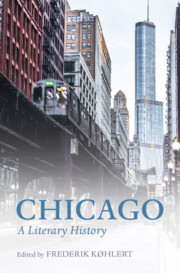Book contents
- Chicago: A Literary History
- Chicago
- Copyright page
- Contents
- Figures
- Contributors
- Acknowledgments
- Introduction: The Literary History of Chicago
- Part I The Rise of Chicago and the Literary West
- Part II Business Unusual: A New Urban American Literature
- Part III Radicalism, Modernism, and the Chicago Renaissance
- Chapter 11 Progressive Chicago: Upton Sinclair, Jane Addams, and Social Reform Literature
- Chapter 12 From the Prairie to the City: Willa Cather’s “City of Feeling”
- Chapter 13 Poetry, the Little Review, and Chicago Modernism
- Chapter 14 A Spirit of Two Ages: The Romantic Modernism of Carl Sandburg’s Chicago Poems
- Chapter 15 Building a Movement: Mary Reynolds Aldis and Little Theatre in Chicago
- Chapter 16 Father to Son: Floyd Dell, Sherwood Anderson, and the Chicago Renaissance
- Part IV A City of Neighborhoods: The Great Depression, Sociology, and the Black Chicago Renaissance
- Part V Traditions and Futures: Contemporary Chicago Literatures
- Selected Bibliography
- Index
Chapter 12 - From the Prairie to the City: Willa Cather’s “City of Feeling”
from Part III - Radicalism, Modernism, and the Chicago Renaissance
Published online by Cambridge University Press: 02 September 2021
- Chicago: A Literary History
- Chicago
- Copyright page
- Contents
- Figures
- Contributors
- Acknowledgments
- Introduction: The Literary History of Chicago
- Part I The Rise of Chicago and the Literary West
- Part II Business Unusual: A New Urban American Literature
- Part III Radicalism, Modernism, and the Chicago Renaissance
- Chapter 11 Progressive Chicago: Upton Sinclair, Jane Addams, and Social Reform Literature
- Chapter 12 From the Prairie to the City: Willa Cather’s “City of Feeling”
- Chapter 13 Poetry, the Little Review, and Chicago Modernism
- Chapter 14 A Spirit of Two Ages: The Romantic Modernism of Carl Sandburg’s Chicago Poems
- Chapter 15 Building a Movement: Mary Reynolds Aldis and Little Theatre in Chicago
- Chapter 16 Father to Son: Floyd Dell, Sherwood Anderson, and the Chicago Renaissance
- Part IV A City of Neighborhoods: The Great Depression, Sociology, and the Black Chicago Renaissance
- Part V Traditions and Futures: Contemporary Chicago Literatures
- Selected Bibliography
- Index
Summary
Perhaps best known for inscribing prairie landscapes and Nebraska small town life in her stories, American author Willa Cather also inserted Chicago cityscapes into her fiction, most notably in The Song of the Lark (1915) and Lucy Gayheart (1935). Having never lived in Chicago, Cather experienced the city primarily as a hub of railway transportation. Multiple encounters over several decades, beginning with a transit of the city when Cather was nine years old, familiarized the author with Chicago’s architectural and cultural features. Commerce and entertainment delivered by rail to Red Cloud, the small Nebraska town in which she spent her adolescence, and to Lincoln, where Cather attended the University of Nebraska, further connected the author with the metropolis. In her short fiction and novels, Cather demonstrates the vital importance of Chicago to the artistic development of her protagonists.
Keywords
- Type
- Chapter
- Information
- ChicagoA Literary History, pp. 167 - 179Publisher: Cambridge University PressPrint publication year: 2021

